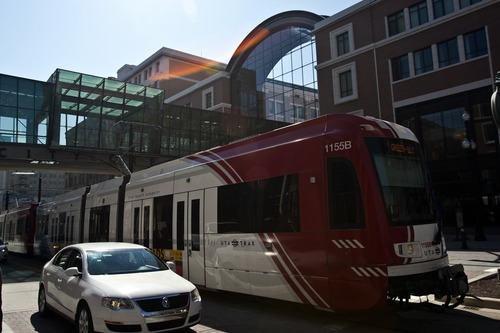This is an archived article that was published on sltrib.com in 2013, and information in the article may be outdated. It is provided only for personal research purposes and may not be reprinted.
Transportation leaders from around the country launched an effort Tuesday to persuade Congress to raise an extra $30 billion a year for highways and mass transit — and said a partial model for their lobbying is how Utah leaders have been building support for transportation funding in the Beehive State.
In short, they aim to show what needs exist, how extra funding could boost the economy and then allow business leaders to drive the push — which they say has worked well in Utah.
"The way we have articulated the problem is one of continuing economic growth through transportation," Salt Lake County Mayor Ben McAdams explained Tuesday to a Washington, D.C., meeting of Transportation for America — an alliance of elected, business and civic leaders from around the country.
That approach has worked so well for Utah that "Salt Lake is eating our lunch when it comes to transit investments" and attracting new business, Will Schroeer, director of infrastructure for economic development for the Minneapolis and St. Paul chambers of commerce, told the group.
McAdams noted that the approach of selling transportation as a way to improve the economy helped build support needed for the Utah Transit Authority to just complete adding 70 miles of new rail lines two years early and under budget, and for such highway projects as using local money to rebuild Interstate 15 in Utah County.
McAdams illustrated Utah's approach by mentioning an incident that occurred to him on a recent trip to Washington, D.C., on a cold day. He and a friend saw a sign advertising scarfs for $5 in a clothing store. "We walked in to get a scarf, and $200 later we walked out with scarves, ties and gloves" because they took advantage of other good deals they saw.
"When I think of transportation in Utah, transportation is the $5 scarf that is going to grow our economy, that's going to bring businesses to our state and help our economy grow," he said.
McAdams noted that state and regional planners for highways and mass transit in Utah recently issued a unified plan for projects needed through 2040. The Utah Foundation issued a subsequent report saying current taxes would fall $11.3 billion short over 30 years to fund priority projects identified in that unified plan.
McAdams said the Salt Lake Area Chamber of Commerce then commissioned another study that said "if we are to fully implement this unified transportation plan, both transit and traditional roads … that would generate an additional $183 billion in gross domestic product. That the $200 in ties from the $5 scarf."
Utah business and civic leaders have used such data to persuade the Legislature this year to study how and whether to raise taxes to fund projects in the 2040 plan. For example, its Transportation Interim Committee is scheduled Wednesday to discuss potentially raising gasoline taxes to meet some of the needs.
Transportation for America officials like the approach, and the use of business leaders to build support for extra funding. "Local business leaders recognize that the right transportation infrastructure is a matter of economic life and death," Schroeer said. "But we know we can't go it alone, so it's important to join with leaders from other communities to ensure that we have a strong federal partner."
The group held a conference Tuesday in Washington to hear leaders from such places as Salt Lake City; Nashville, Tenn.; Sacramento, Calif.; Minneapolis; Los Angeles; Cincinnati; Atlanta; Tampa Bay, Fla. and others talk about the transportation needs they have — and what it means to their economic futures.
"Transportation investments make common sense," said Marc Morial, president of the National Urban League and former mayor of New Orleans. "Helping people of all wage levels get to work and get to jobs, helping employers get access to the widest community of employees. It's something that all of us, people from all parts of the political spectrum, should be able to agree on."



